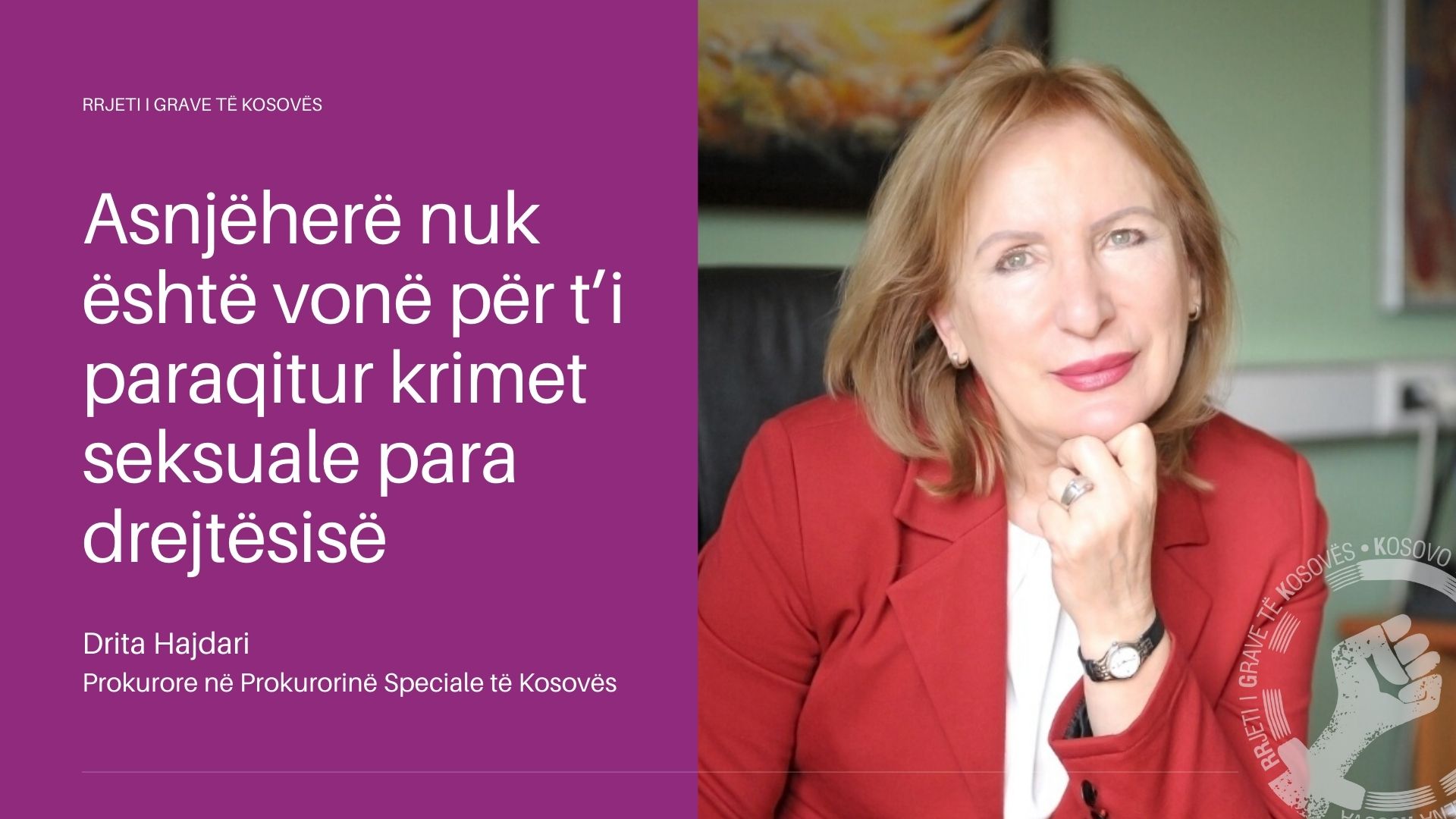This month, Zoran Vukotiq was sentenced to 10 years in prison for committing sexual violence during the war in Kosovo. This is the first case of someone being convicted of such a crime in Kosovo by a local court.
The prosecutor, Drita Hajdari, who worked closely with this case, and met the survivor, talks to the Kosovo Women’s Network (KWN) about her experience, and contribution, as well as the importance of reporting sex crimes and punishing the guilty.
Two Decades After the War, Only One Person Convicted of War-time Sexual Violence
At the beginning of our conversation, we are reminded that even though it has been over two decades since the end of the war, and, despite the presence of two powerful missions for the rule of law, UNMIK and EULEX, war crimes remain a major problem for Kosovo justice.
“With the first cases, we faced a very serious situation and there were many challenges. However, there is hope and determination that these obstacles will be overcome and war criminals will be brought to justice “, says Hajdari.
War crimes are criminal offenses that are listed as crimes against humanity, defined not only in the Criminal Code of Kosovo, but also in international humanitarian law.
“Among war crimes, sexual assault is one of the most serious crimes a human being can experience,” she said.
“These crimes were committed by members of the Serbian military, police and paramilitary formations, in the most brutal and humiliating forms. […] ”
Meeting the Survivor and Vukotiq’s Sentence
Hajdari claims she took the Vukotiq’s case not only as a legal responsibility but also as a human responsibility.
She recounts the experience of meeting with the survivor.
“In the first meeting, I tried to build trust and legal support. From the beginning, I have taken care to protect her identity to avoid potential stigma. I explained to the survivor that she was not to blame for what happened. […] ”, says Hajdari.
Hajdari interviewed the survivor at the premises of a women’s rights organization, where she had undergone treatment by a professional team. Thus, the survivor was spared from going through interrogation at the prosecutor’s office, which could have been incredibly triggering.
In court, the procedure was conducted without the public present. Under these circumstances, the survivor testified in the presence of her lawyer and a representative of this organization.
“As the prosecutor of the case, I have provided the court with definitive evidence which proved that the crime was committed against this survivor by the defendent,” said Hajdari.
Given the violence in which these acts were committed during the war and the continuous consequences that survivors face, prosecutor Hajdari considers this sentence can only partially compensate for women’s pain and suffering.
“The length of the sentence is not determined by the prosecution, but by the court. During the concluding arguments, the court must assess all the circumstances which, according to the law, affect the sentencing for the committed criminal offense”, adds Hajdari, while talking about punishment.
We Should Not Keep Silent About Sex Crimes
No punishment can compensate for this experience. However, restoring justice, after two decades can make survivors of sexual violence breathe more freely.
As part of the conversation, Hajdari highlighted the importance of prosecuting these crimes, and thus recognizing sexual violence as a war strategy. It should not remain a hidden tragedy in our country..
“There are still no comprehensive statistics on the number of women who have survived sexual violence. Some women offered their stories, but many will forever remain silent because of untreated physical and mental trauma, compunded by the fear of their family and community reactions,” she says.
According to Hajdari, these women need full support, primarily from their family but also from society as a whole.
“What happened was not the survivor’s fault. What happened to them was part of the enemy’s strategy for occupying the territory, for ethnic cleansing, and in particular hatred and humiliation against women”, says Hajdari.
“With today’s conviction, women can feel free and safe to testify. They are guaranteed full legal protection for not revealing their identity,” Hajdari recalled.
Given that Kosovo Women’s Network has consistently made efforts to recognize and respect the survivors of sexual violence during the war in Kosovo, and has member organizations that work in this field, Hajdari gives a message to the survivors of sexual violence and the importance for them to speak and testify about the experiences.
“Crime is a crime, and it must be punished. These criminal offenses are not statute-barred, therefore it is never too late to present these cases before the authorities, to fulfill our moral and legal obligation to the survivors, as well as to sanction the perpetrators of these criminal offenses.” says Hajdari as she concludes her conversation with KWN.
This case was supported by the Kosova Rehabilitation Centre for Torture Victims (KRCT), member organization of KWN. Read HERE the reaction of KRCT regarding the sentencing of Vukotic.
*****
Related articles:
KWN Calls for Respect, Recognition for Survivors of War-time Sexual Violence
SGG Calls for Specialized Services for Addressing Sexual Violence and Support for Survivors







